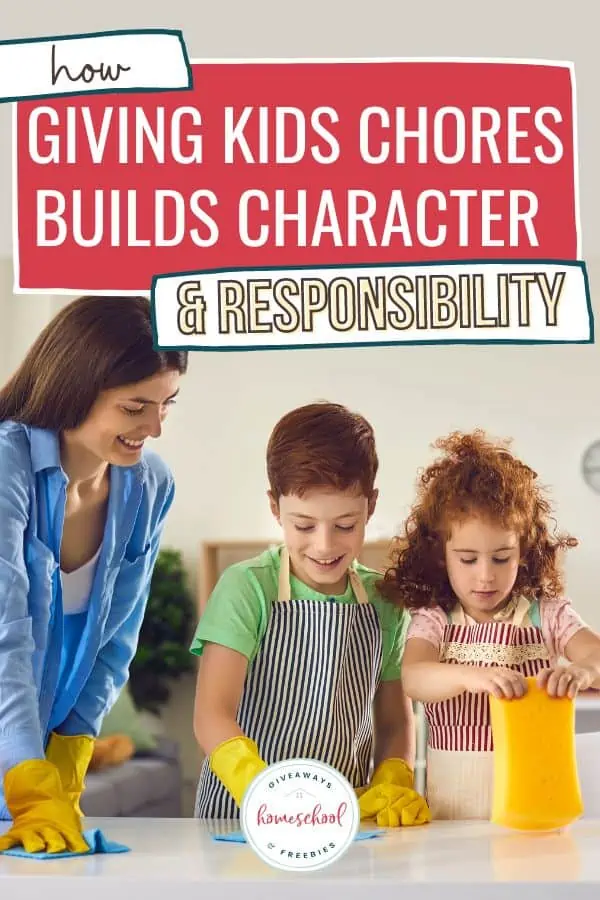How Giving Kids Chores Builds Character & Responsibility
Published:
November 28, 2022

Contributor:
Alpha Omega Publications
Disclosure: This post may contain affiliate links, meaning if you decide to make a purchase via my links, I may earn a commission at no additional cost to you. See my disclosure for more info.
Do your kids do chores? While there can be a bit of controversy around the topic of whether to pay them for household chores or not, many homeschool families will agree that having your kids do chores on a regularly basis is actually good for them. Here’s why.
Should Kids Do Chores?
If you’ve ever thought, “Should kids have chores?” then we’ve got the detailed answer for you here! Moms of littles soon realize that it really is a team effort to keep the household running while also homeschooling.
And once you have a toddler in your home, you realize that there are some household tasks that kids at a young age can do. And many toddlers think that chores are fun, because they get to spend time with mom while doing them. But there are definite benefits to giving household chores to kids.
Benefits of Giving Kids Chores
There are reasons why giving kids chores is a great idea. Most of these reasons have to do with helping them grow and mature. One benefit of chores is that it gives kids higher self-esteem and a sense of accomplishment.
Chores Help Teach Life Skills
Teaching life skills is an essential job of homeschool parents. And one of the methods you can use to teach life skills to your children is the responsibility of chores. Every adult needs to know how to keep the house in order, prepare simple meals, and do their own laundry. Why not start teaching these life skills early?
Chores Help Kids Learn Responsibility
Chores give children a sense of responsibility and help set them up for future success as independent adults. Many of the chores that you can ask your kids to do are life skills that they will want to learn to be mature adults. It’s important for family members, even children, to take some of the responsibility for running the household smoothly.
Chores Help Teach Teamwork
One of the biggest reasons kids should have chores is because it helps teach teamwork. When they realize they are important contributors to the family, it shows that it takes everyone’s effort to help keep the household running smoothly. Being an integral part of the family gives a great sense of belonging to kids. Being a part of a team is a necessary component of healthy families.
Chores Help Build a Strong Work Ethic
Having the responsibility of daily chores helps grow a strong work ethic in children. Even younger children can learn new skills and put their best effort toward daily or weekly chores. Kids who grow up with regular chore expectations have a stronger work ethic as teens and adults.
Chores Help Improve Time Management Skills
Regular chores help improve time management skills as kids learn how to fit them into their daily schedule and routine. One of the benefits of chores is to allow your children to fit them in their schedule and around their schoolwork.
Some kids will want to get all their chores done right away in the morning, while others might prefer to do them at the end of the day. Either way, kids will learn how to budget enough time for the chores and it will help them improve their time management skills.
How to Get Children Involved in Chores
Even young children can start to help with simple tasks at an early age. An easy way to get children involved in household chores is to download a free weekly chore chart printable and start filling it in.
Check our lists of age-appropriate chores below.
Making chores a regular part of a child’s life from the early years will help it become just a natural part of life. If you wait many years to start implementing chores, it might be a bit harder, but it’s not impossible.
When Should You Start Your Child on Chores?
If you’ve answered the question, “should kids have chores?” with a resounding yes, then you stay might wonder when you should start your child on chores.
How young is too young?
As soon as you start teaching your toddlers basic life skills like cleaning up their toys, brushing their teeth, or feeding the dog, then your kids are ready for a regular chore time. Just make it a regular part of life and your kids, even the youngest ones, will catch on fast!
If you can tie the chores in with regular events in your daily routine, it will be easier to make sure those chores get done.
So the regular events for most homeschool families include waking up, eating breakfast, lunch, and dinner, and bedtime. Planning regular chores around those times will help you stay organized even if you have busy schedules.
What Chores Can a Kid Do?
When you’re wondering what chores can a child do, the most important thing to consider is that child’s development. You will want the right chores for a child’s age, so we’ll include some helpful lists for you below.
Are you curious what other homeschool families require of their own kids? When homeschool parents were asked which chores they give their own kids, the most popular one was picking up their own belongings. It certainly is a good place to start! Here are more ideas.
Chores for children of different ages
You’ll want age-appropriate chores for your kids. Here are some tasks to consider adding to their regular chore responsibilities.
Toddlers (2-3 years)
Here are some simple chores that young kids around 2-3 years old can do. Toddlers are motivated by sticker charts as they complete these small tasks during the week.
- Dust
- Make bed
- Feed pets
- Pick up toys
Preschoolers (4-5 years)
Here’s a list of chores for your preschoolers. They can do everything from the toddler list and add these new tasks:
- Complete self-care tasks like brushing teeth
- Water plants
- Set table
- Put away groceries
School-age children (6-11 years)
School-age children in elementary school are at the perfect age to add in more complex daily chores.
- Practice instrument
- Wash dishes
- Take out garbage
- Fold laundry
- Get mail
- Clean room
- Sweep or vacuum floors
- Start doing their own laundry
Teenagers (12-18 years)
When your teenagers reach the middle and high school years, they can be more responsible for bigger chores as they learn practical life skills.
- Mow lawn
- Shovel snow
- Wash, dry, and fold their own laundry
- Cook a meal
- Vacuum
- Clean the bathroom
Paying Kids for Chores
Paying kids for chores is definitely a controversial topic in the parenting world! One side says kids should do chores just because they’re part of the team, or part of the family. Since mom and dad don’t get paid to do chores, neither should the kids. The other side says kids should get some pocket money for the chores they do because it’s motivational and it helps them learn to manage money.
Both sides have valid arguments.
What’s an advantage of paying a kid to do chores? Whether you pay your kids for their regular chores or just for extra chores they do, it really does help teach kids about money management. Older kids have more expenses than the younger kids, and by paying for chores, you then give kids the opportunity to make more financial decisions.
For example, if you pay your child for chores, you can let them be responsible for paying for fun “extras” that come along. So, if your child has earned their own chore money, they will have to decide if buying a new toy is a good financial decision for them. When it’s all based on mom and dad’s money, kids don’t think through purchases as carefully.
How Much Should a Kid Get Paid for Chores?
This question of how much should a kid get paid for chores is another sticky one. There’s no right answer and you’ll have to decide what makes the most sense for your family.
If you want your children and teens to be more responsible for their own spending (buying clothes, toys, and entertainment), then you’ll likely pay them more for chores so they have more money for discretionary spending. However, if you purchase everything they need, then you wouldn’t necessarily need to pay them as much for chores.
Money for Chores is Great Motivation
Another aspect is that the payment needs to be motivational. Small amounts of compensation are very motivating for young children! If they can take a week or two of hard work and see the results (like a new toy from the dollar store), then that’s plenty for younger kids.
Teens, however, aren’t going to be as motivated if you’re paying them the same amount as their preschool sibling. So, the ages of your kids need to be kept in mind. Some families decide on a weekly base pay dependent on age, with payment for chores going up each time you have a birthday.
For example, your eight year old could make $8 a month for doing daily chores. Your fourteen-year-old might make $14 a month. For some of you, this will be plenty. For other families, you’ll need to double this amount! For others, especially if you have a very large family, this amount might be impossible to maintain. Just do what makes sense for your family.
In Conclusion
Including your kids in childhood chores is a great way to foster a pitch-in mindset. The importance of chores cannot be overrated – you really are setting your kids up for future success when they can learn to be responsible members of the family.











